Cox’s Bazar 25 February 2023. Every day, tons of plastic waste is produced in Cox’s Bazar and Rohingya camps. Which causes the loss of our environment along with the cropland of this locality are damaging. To save the biodiversity, all types of plastic use should be stopped immediately.
Speakers said these at the event arranged at the premises of Cox’s Bazar District Administration Office on 25th February 2023 at 11 am. Speakers also said the Bhakkhali river of Cox’s Bazar is full of polythene now. Garbage is being thrown everywhere in municipal areas. The whole country is like a garbage dump station. Govt has made anti-plastic laws. But the law is not being implemented. Polythene factories are kept open illegally. The use of plastic in Cox’s Bazar and Rohingya camps must be stopped immediately. Law of government should be implemented. The use of plastic must be stopped by creating alternatives. To make this happen, the holistic interest of all relevant stakeholders is needed.
Chief Executive of PAHLS and CCNF Co-Chair Abu Morshed Chowdhury, Mukti Chief Executive of Mukti Cox’s Bazar and also CCNF Co- Chair Bimal Chandra De Sarkar, BAPA (Bangladesh Paribesh Andolan) Cox’s Bazar President Fazlul Kader Chowdhury, Cox’s Bazar Literature Academy General Secretary and Poet Ruhul Quader Babul, Prominent Academician Maqbool Ahmed, Cox’s Bazar Climate Committee Leader Kamal Uddin Rahman Pyaru, President of Cox’s Bazar district press club Faridul Alam Shaheen, President of Cox’s Bazar Costal Journalists Forum SM Iqbal Bahar Chowdhury, Organizing Secretary of BAPA Cox’s Bazar H.M Nazrul Islam, President of Chayanir Kallol Dey Chowdhury, Chief Executive of PULSE Bangladesh Saiful Islam Chowdhury Kalim & Co-Chair of CCNF and Executive Director of COAST Foundation Rezaul Karim Chowdhury spoke at the event.
Mizanur Rahman Bahadur & Assistant Director of COAST and CCNF Member Secretary Zahangir Alam jointly moderate the event. Different NGO representatives were also present during this event.
In the opening remarks of the event Abu Morshed Chowdhury said, “We need to stop using plastic if we want to save our blue economy. For this, we need the proper execution of government law also.”
Rezaul Karim Chowdhury said “On behalf of CCNF, we urge to Filippo Grandi, Head of the United Nations High Commissioner for Refugees, and Arjun Jain, principal Coordinator of Inter Sector Coordination Group (ISCG) to take necessary initiatives to stop using plastic in the relief activities in the Rohingya camps. Hope they will take the necessary steps. We will reward those UN organizations, INGOs, and National and Local NGOs who will take such initiatives to stop using plastic in the Rohingya camps”.
Fazlul Kader Chowdhury said “According to research, it takes about 70 years for a plastic product to decompose. I appeal to the Bangladesh government to execute the laws to stop the use of plastic. It’s also been proved by scientists that, rainwater cannot go down If the plastic is under the ground. In the recent time in Cox’s Bazar, we can see that the water has become salty”.
Bimal Chandra De Sarkar denoted that “Plastic covers about 40% of the ocean surface, and scientists fear that by 2030 there will be more plastic than fish on the ocean. And about 100,000 marine lives die every year because of plastic.”
Maqbool Ahmed said “Political will and decision are very important to stop the production and sale of plastic. It is important to engage the policy makers and relevant legislators in the government with the movement to stop plastic use”.
Related Document [Bangla Press] [English Press] [Position Paper]
Photos
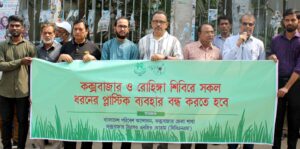 |
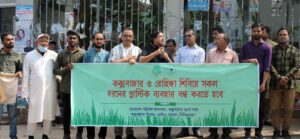 |
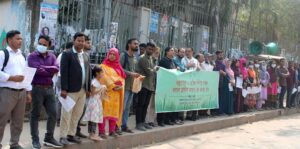 |
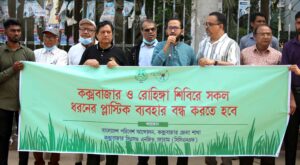 |
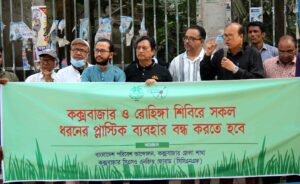 |
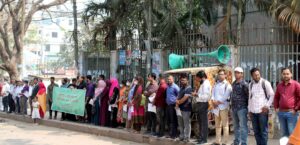 |
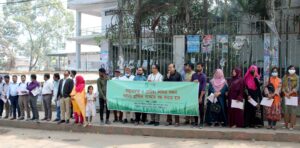 |
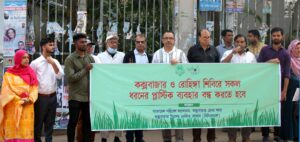 |
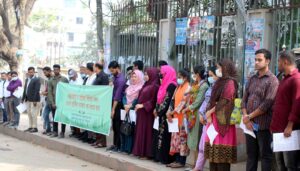 |
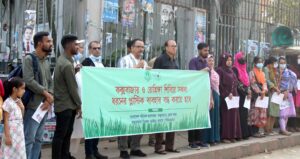 |
Newslink National
 |
|
 |
 |
 |
 |
 |
 |
 |
 |
Newslink Cox’s Bazar
 |
 |
 |
 |
 |
 |
 |
 |
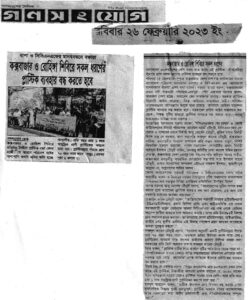 |
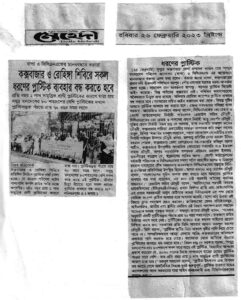 |
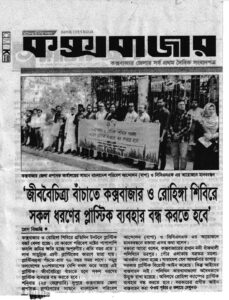 |
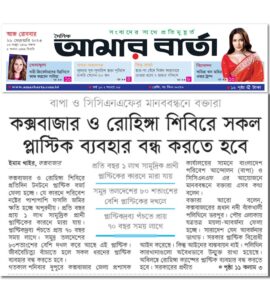 |
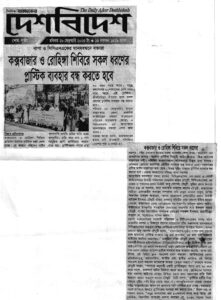 |
|

